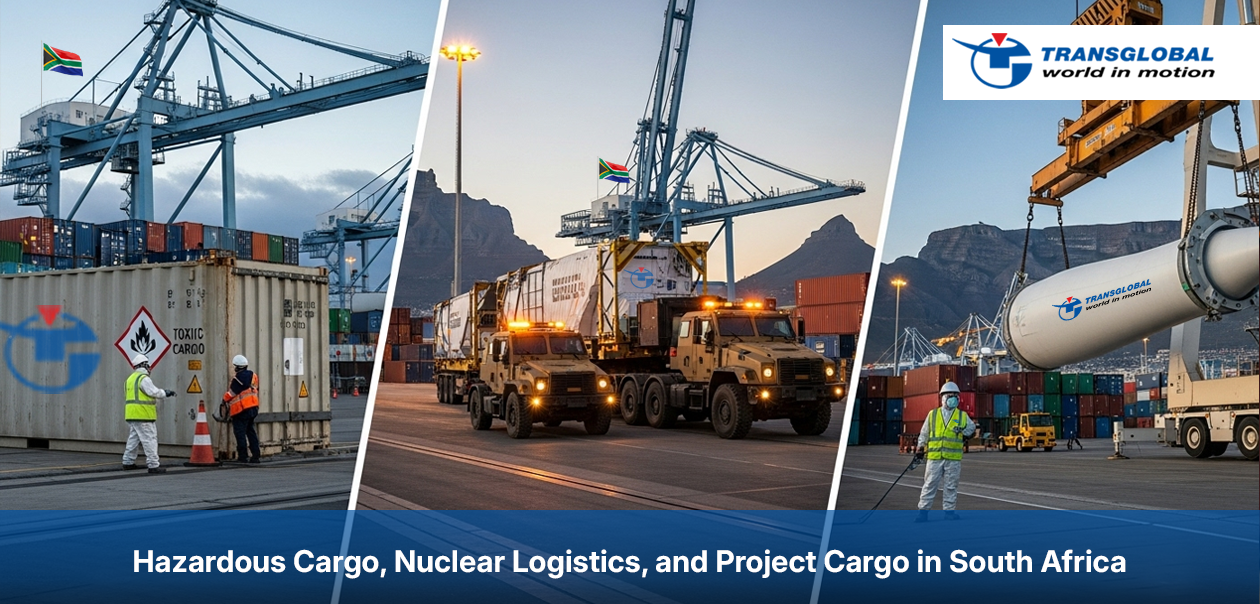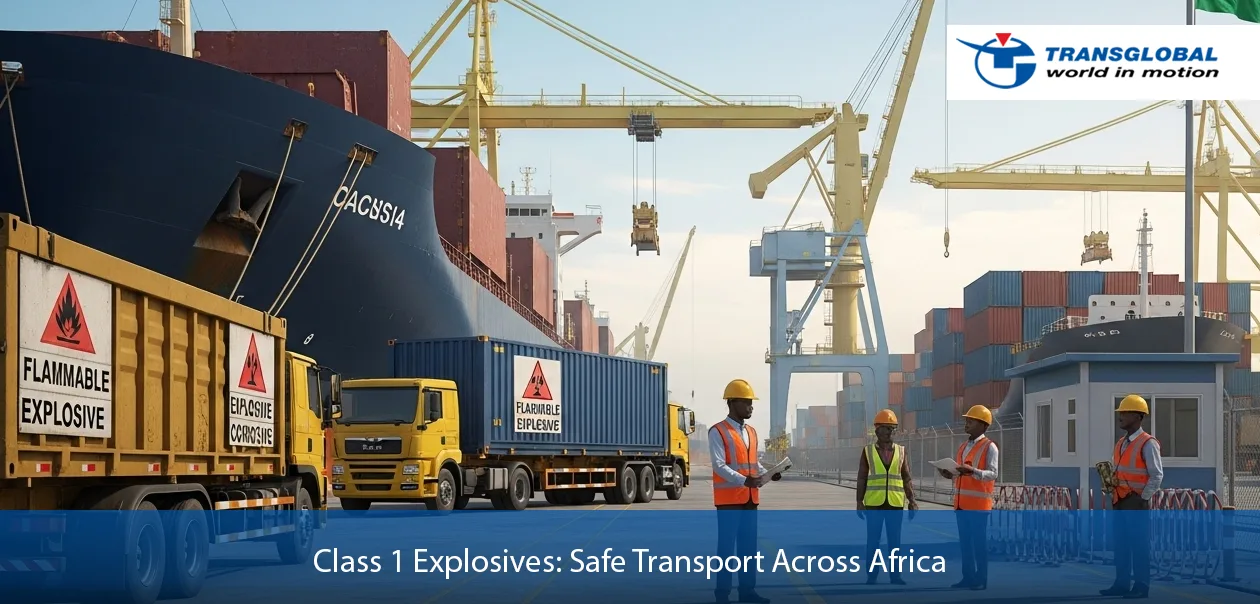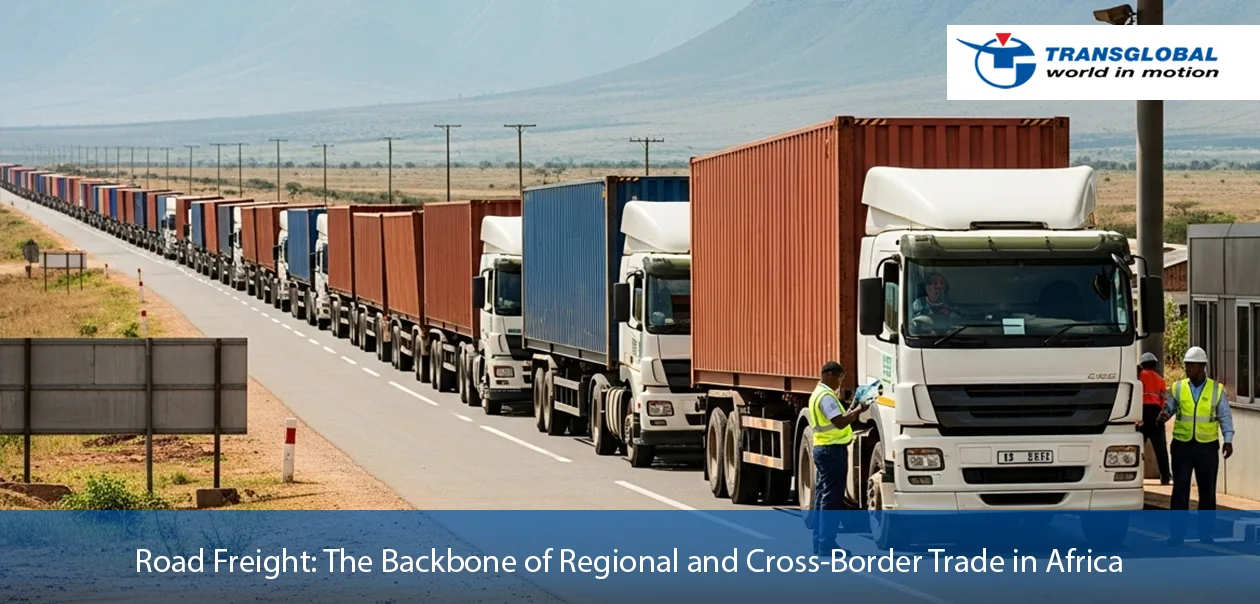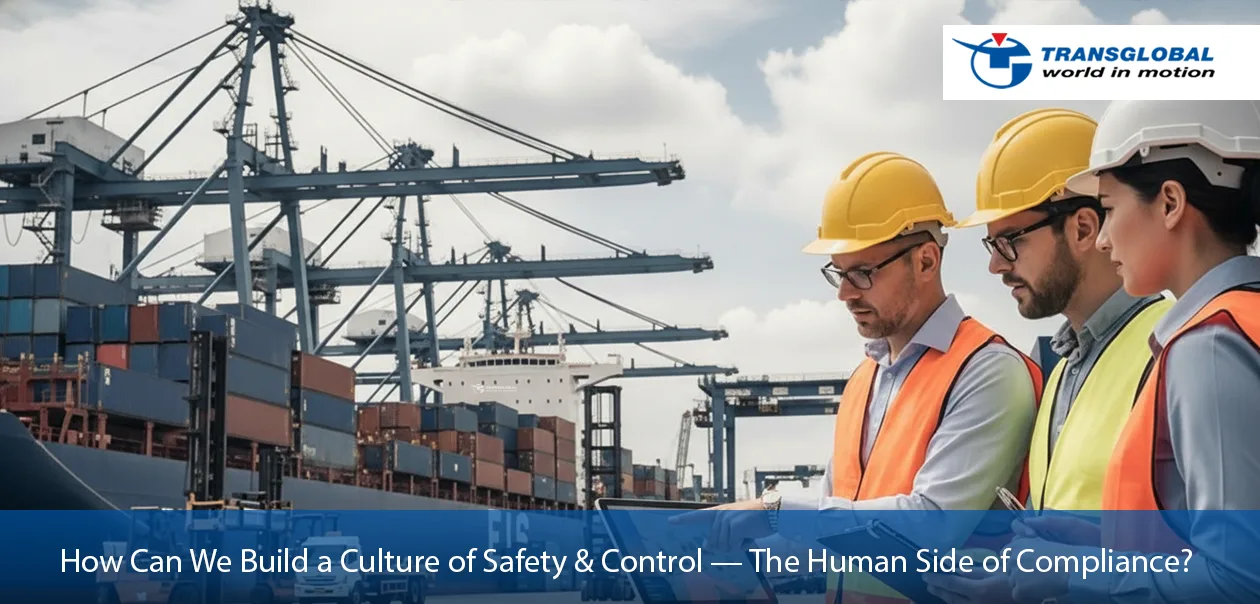Imagine you are standing on a Johannesburg loading dock as workers delicately prepare a shipment of volatile chemicals destined for a mining operation. Or consider the stakes involved in moving radioactive isotopes essential to cancer treatment across African borders. Or think of project cargo, massive transformers, wind turbine blades, or mining trucks so enormous they require specialized engineering surveys and convoy escorts.
In South Africa’s dynamic logistics landscape, moving high-risk or oversized cargo is far more than simply putting goods on a truck or a vessel. It’s about trust, precision, and deep compliance expertise. For businesses in sectors like energy, mining, defense, and infrastructure, the ability to safely and legally transport hazardous, nuclear, and project cargo can mean the difference between operational success and catastrophic setbacks.
So, how do companies ensure this type of cargo moves safely and legally? Let’s explore the essentials.
Understanding the Risks: Why Specialized Cargo Demands Specialized Care?
Hazardous and project cargo, and certainly nuclear materials, come with challenges that go far beyond everyday logistics:
- Regulatory Compliance: Global rules like the IMDG Code are strictly enforced in South Africa, alongside SANS standards, NRCS regulations, and regional border protocols.
- Safety: One error in handling hazardous materials can endanger lives, damage infrastructure, and create environmental disasters.
- Reputation: Mishandling sensitive cargo can severely damage brand reputation and business relationships.
- Operational Complexity: Large loads or sensitive materials require unique routing, special permits, technical escorts, and specialized equipment.
This is why “generic” logistics providers are simply not equipped for such shipments. You need logistics partners who combine technical know-how with strict compliance discipline and a genuine commitment to safety.
Transglobal’s Core Industry Segments – Where We’re Already Experts
Transglobal Cargo has built its reputation in some of the most demanding sectors of logistics. We are a specialist freight forwarder operating within the highly regulated and mission-critical field of hazardous goods logistics, with significant emphasis on:
Class 1 (Explosives): Including military logistics and defense explosives, commercial blasting agents, and ammunition. Transglobal’s work here directly supports security, defense, and mining operations.
Class 2–9 hazardous materials: Including gases, flammable liquids, corrosives, and various dangerous goods that require specialized handling and stringent regulatory compliance.
These services have made Transglobal a trusted logistics partner for critical industries such as:
- International Defense Contractors
- Mining Corporations
- Governmental Procurement Units
Our experience in these sectors means we’re not only moving cargo, we’re safeguarding critical supply chains for industries where mistakes simply cannot happen.
Moving Hazardous Cargo: Safety Above All Else
Hazardous cargo encompasses everything from flammable chemicals and toxic substances to explosive materials and gases. These are regulated under strict international standards like the IMDG Code and South African regulations overseen by authorities such as the Department of Transport and the NRCS.
How Hazardous Cargo Moves Safely?
- Classification and Documentation: Every shipment begins with proper classification, including Safety Data Sheets (SDS). Misclassification can halt shipments and incur heavy fines.
- Specialized Packaging: Approved containers, drums, or tanks are essential to prevent leaks, fires, or chemical reactions during transport.
- Trained Personnel: Only certified staff are allowed to handle hazardous cargo. Transglobal ensures that all handlers are trained for IMDG Classes 1–9.
- Careful Route Planning: Routes avoid congested urban areas, environmentally sensitive regions, and known high-risk zones.
- Emergency Response Preparedness: Spill kits, fire suppression tools, and detailed response plans are mandatory.
Navigating Nuclear Logistics and Radioactive Materials
Few logistics challenges are as sensitive, or as regulated, as transporting radioactive materials. South Africa’s nuclear industry includes medical isotopes, mining applications, and research-related shipments, all subject to rigorous legal oversight.
Why is Nuclear Logistics So Demanding?
- Security Risks: Radioactive cargo must not fall into the wrong hands. Tight security and discreet routing are non-negotiable.
- Health Hazards: Radioactive materials require specialized containment and monitoring to protect handlers and the public.
- Regulatory Complexity: Moves require clearances from multiple agencies, including the National Nuclear Regulator (NNR), SAPS, and international bodies.
Transglobal’s expertise includes managing nuclear shipments from door-to-door, coordinating secure packing, certified drivers, radiation monitoring, and regulatory liaison.
How Nuclear Logistics is Managed?
- Specialized Containers: Type-A and Type-B containers shield materials against physical impact and environmental hazards.
- Radiation Monitoring: Real-time tracking and radiation dosimetry ensure safety throughout transit.
- Comprehensive Permits and Documentation: No shipment moves without exact regulatory compliance and documented approvals.
In nuclear logistics, even a small error has potentially serious implications. That’s why Transglobal maintains meticulous standards and relationships with regulatory authorities.
Project Cargo: Engineering Meets Logistics
Project cargo includes oversized, overweight, or complex shipments that standard shipping solutions can’t handle, think giant mining equipment, transformers, or industrial plants relocating across borders.
Project Cargo Challenges:
- Out-of-Gauge Dimensions: Some loads exceed normal height, width, or weight restrictions.
- Permitting and Escorts: Special routes and approvals are required for heavy lifts.
- Engineering Coordination: Every bridge, turn, and gradient along the route needs consideration.
- Tight Timelines: Projects often run on critical schedules, leaving no room for transport delays.
How Transglobal Moves Project Cargo Successfully
- Feasibility Studies and Surveys: Identifying obstacles like bridges, tunnels, and road restrictions.
- Custom Equipment Solutions: Using modular trailers, cranes, and hydraulic lifting systems.
- Integrated Teams: Engineers, logistics planners, and government authorities work in unison.
- Transparent Costing: Complex loads require precise forecasting with escalation factors for unpredictable conditions.
Transglobal handles these projects like engineering operations rather than just freight bookings, ensuring every detail is accounted for.
Transglobal’s New High-Value Cargo Markets
Transglobal Cargo’s growth isn’t limited to traditional hazardous goods. We’re actively pursuing new verticals where our heavy-duty transport capacity, regulatory expertise, and specialized fleet provide a competitive edge:
- Heavy Load & Oversized Cargo: Wind turbines, port cranes, generators, and other industrial equipment. Clients include engineering procurement firms and energy developers across Africa’s infrastructure boom.
- Factory Relocations: Full-service solutions covering plant dismantling, transport, customs compliance, and reassembly. Ideal for manufacturing firms relocating to Special Economic Zones (SEZs).
- Museum, Art, and High-Value Cargo: Climate-controlled, GPS-tracked, insured transportation for art, exhibits, and luxury items. Trusted by museums, auction houses, and cultural institutions worldwide.
- Oil & Gas Sector: High-compliance shipments for upstream contractors and global energy firms. In this high-risk sector, Transglobal ensures smooth handling of complex energy logistics across Africa and the MENA region.
Why Trust Transglobal Cargo?
Transglobal Cargo doesn’t just move shipments, we protect reputations, ensure compliance, and enable business continuity in high-risk, high-value industries. Our strength lies in:
- Certified Expertise: Accredited for IMDG Class 1–9 hazardous goods and one of South Africa’s leading handlers of nuclear shipments.
- End-to-End Services: Covering permits, specialized packing, customs compliance, and delivery.
- Local Knowledge with Global Reach: Deep understanding of African terrain, regulatory environments, and global connections.
- Culture of Safety: Ongoing investment in staff training, advanced monitoring technology, and emergency preparedness.
Conclusion
Whether you’re shipping explosives like chemicals to a mining site, radioactive isotopes for medical research, or giant turbines for renewable energy projects, specialized logistics is not merely about transportation, it’s about strategic problem-solving.
In South Africa’s fast-evolving market, with its complex regulations and diverse terrain, you need a partner who understands that hazardous and project cargo moves aren’t just business, they’re critical missions.
Ready to move your hazardous, nuclear, or project cargo safely and compliantly? Contact Transglobal Cargo today for a tailored logistics plan. Let’s turn complexity into confidence, every mile of the way.





Comments